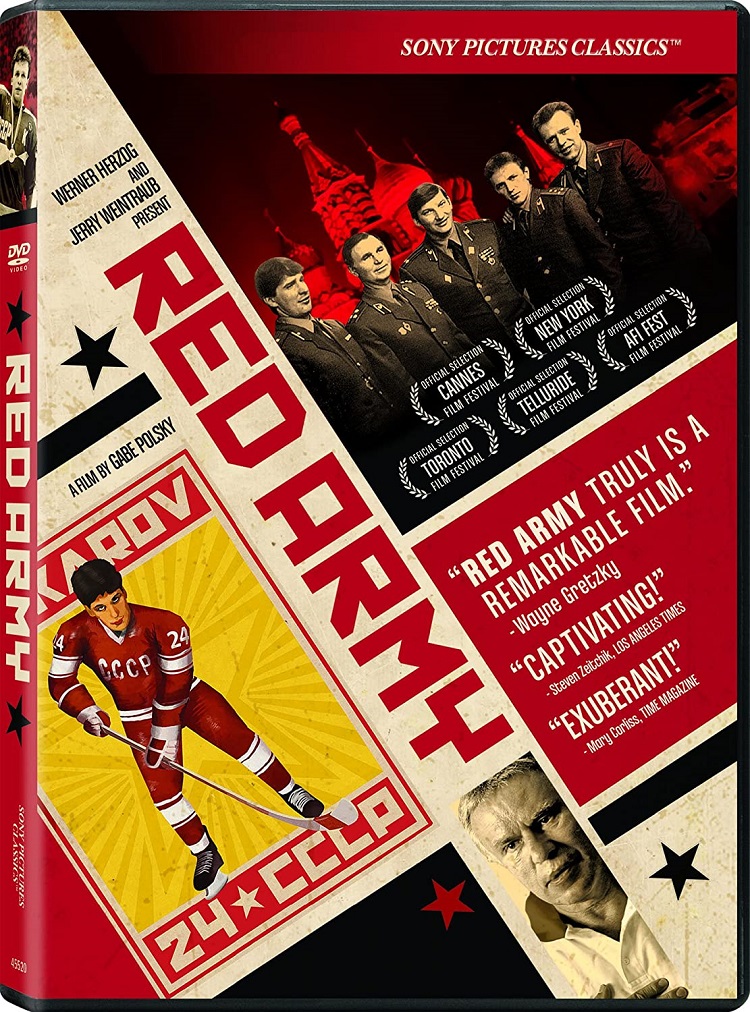
Gabe Polsky’s documentary Red Army tells the story of Viacheslav “Slava” Fetisov, one of the most successful defensemen to ever play hockey. His career ran from 1976-1998, starting as a member of the Soviet national hockey team and later playing for two NHL teams. But just as the story of baseball player Jackie Robinson (42) is not limited to the man or the sport because of the societal issues related with his breaking Major League Baseball’s color barrier, neither is the story of Red Army, which tells a very compelling tale about the Cold War between the Soviet Union and the United States and a few people stuck in the middle who suffered because of a game.
As the film begins, Fetisov, who at the time of the interview was a Russian politician, seems uninterested in taking part. Although seated, he works his phone and ignores Polsky. But as time wears on, Fetisov opens up, and a bond of respect forms between them. Polsky is curious about Soviet hockey for a number of reasons. His parents are from the former Soviet Union, as was a hockey coach he learned under while a young man in Chicago. He also mentions watching and being fascinated by the 1987 Canada Cup, a greatly heralded competition that saw Canada beat the Soviet Union two games to one, with all three games ending in a score of 6-5.
As a Soviet player, Fetisov had two coaches. Anatoli Tarasov is considered one of the all-time greats. He saw hockey as an art form and wrote books about it. He had a profound influence on Fetisov’s life. His unorthodox ways led to success but also led to his firing when he displeased Soviet leaders. Viktor Tikhonov replaced him at the choosing of a KGB chief, and he was brutal taskmaster, who felt players should fear their coach. While they were soldiers in the Soviet army, Tikhonov treated them more like prisoners.
After the loss in the 1980 Winter Olympics to the United States, which still has a deep effect on Fetisov, the team’s veterans were cut and the workload intensified. Training lasted eleven months out of the year with four workouts a day, and no personal time off was allowed, not even for a player whose father was dying, and yet from that arose one of the greatest units in hockey history. Sergei Makarov, Igor Larinov, Vladamir Krutov, Alexei Kasatonov joined Fetisov for a dominating run against both international teams and ones from the NHL. When going up against Czechoslovakia for the Olympic gold medal in the 1984 Sarajevo games, this Soviet team had not lost a game in two years.
While Red Army may appear on the surface to only be of interest to hockey fans, it excels when Polsky dives deeper into the lives of Fetisov and the players off the ice. Retired KGB agent Felix Nechepore offers insight into the political side, talking about traveling with the team to Canada to keep players from defecting. With the Soviet Union’s economy failing, Gorbachev proposed major reforms of Perestroika and Glastnost, but the players were still subject to the whims of their leaders. Some players accepted what happened, some defected to play elsewhere, and some like Fetisov rebelled, which naturally had consequences. Finally, he was allowed to join the NHL, which made for an intriguing final act for his career.
Red Army is important not just for those interested in hockey but in history as well. Though told by their governments that the other was the enemy, the U.S. and the U.S.S.R. had more in common than either side wanted to realize, as revealed once you hear the stories of the Soviet hockey players. The highs and lows they experienced in their lives are recognizable through our shared humanity no matter what country we were born in or what uniform we wear. Red Army is a great documentary because it takes a niche subject and tells a larger, identifiable story with it.
Update: Red Army won the World Cinema Audience Award